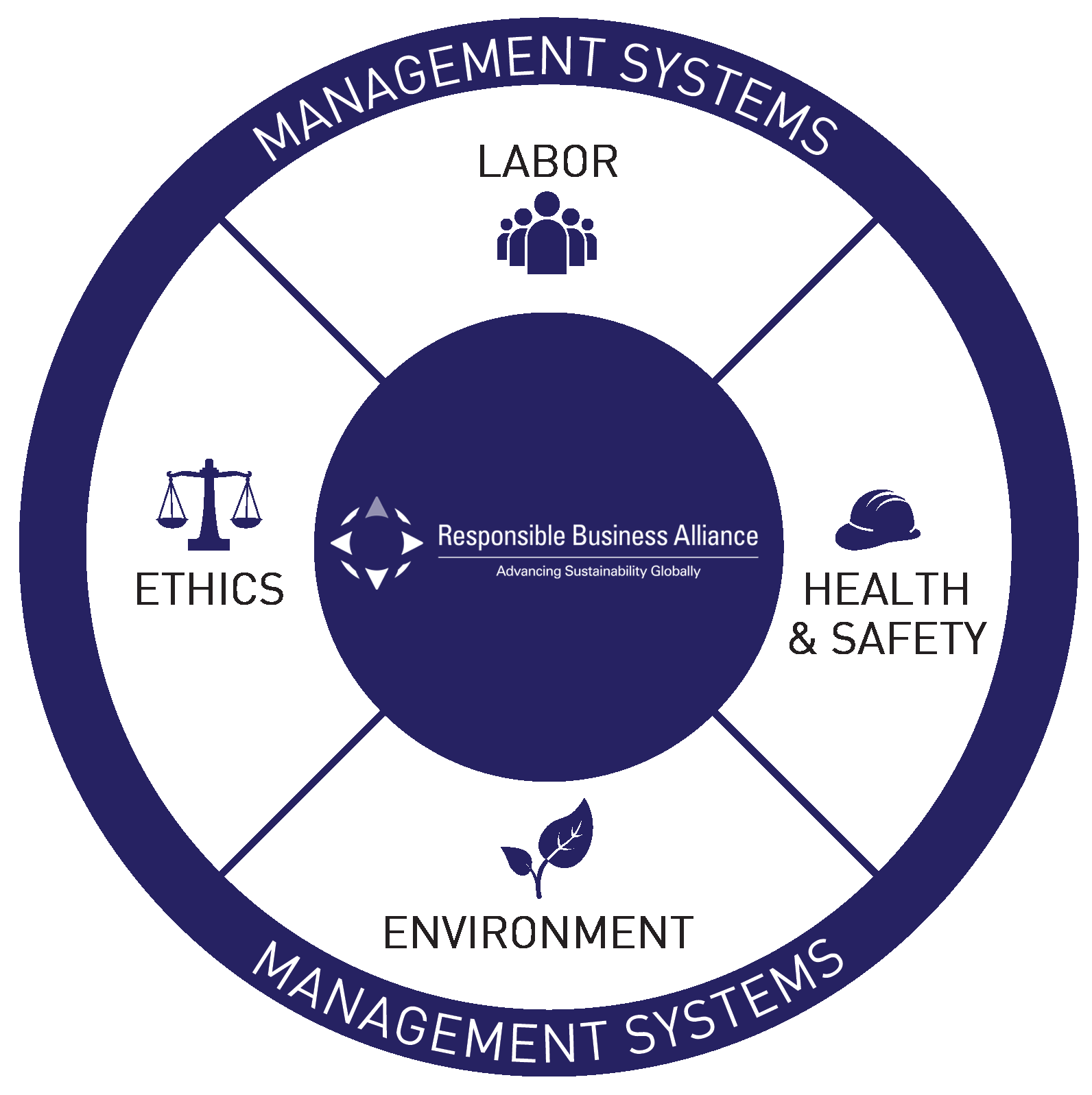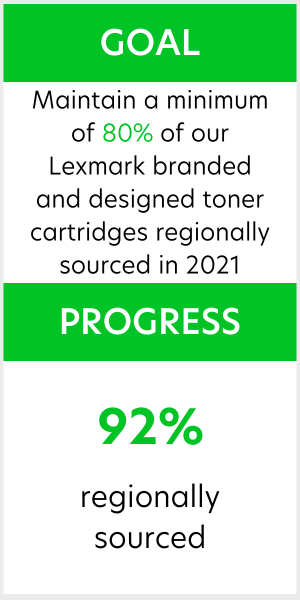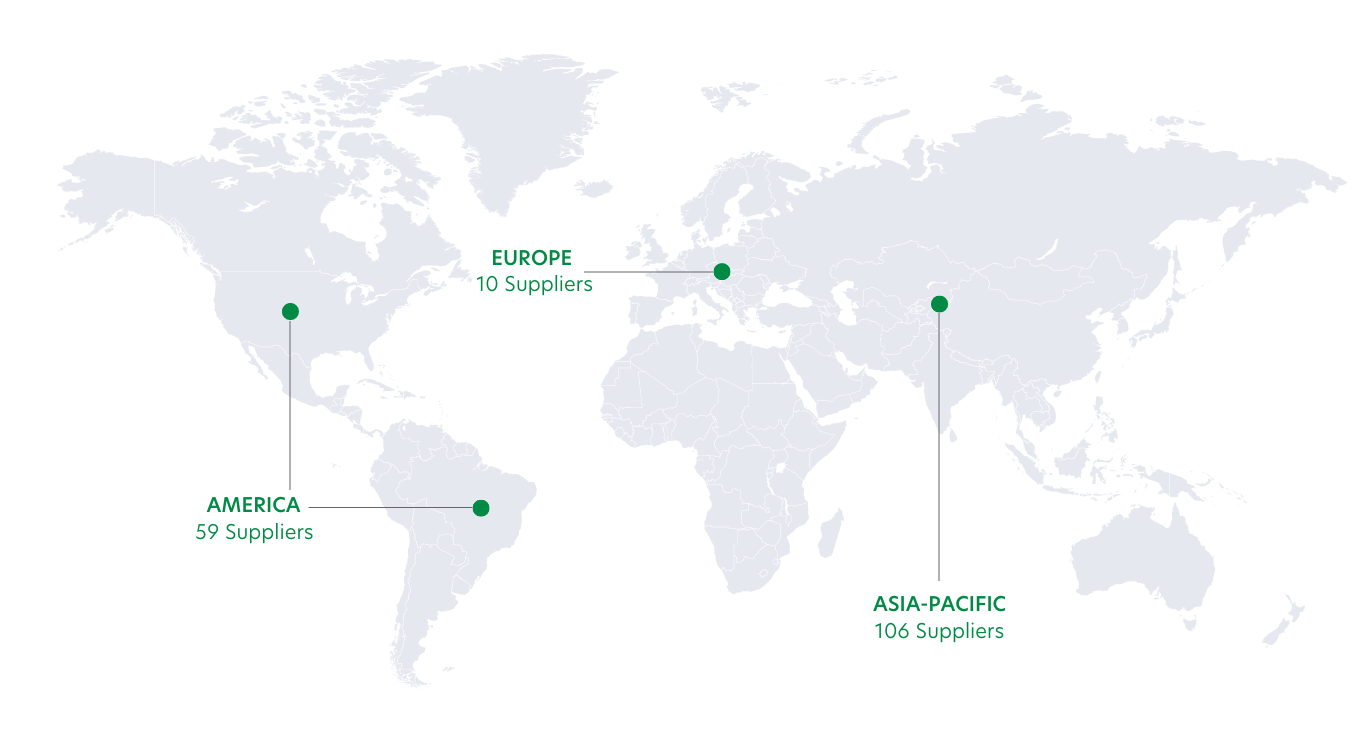
At Lexmark, we choose suppliers who share our vision of corporate citizenship and agree to conform to Lexmark’s expectations and standards. We monitor the performance and compliance of our suppliers by analyzing on a regular basis their social, environmental and economic data.
Our membership and participation since 2009 in the Responsible Business Alliance (RBA) has further strengthened our organizational efforts in support of human rights, labor standards, and other corporate social responsibility values. Lexmark has adopted and actively pursues conformance to the RBA Code of Conduct supplemented by the Lexmark Supplier Code of Conduct.
Lexmark’s Supplier Code of Conduct defines our expectations for suppliers regarding ethical behavior, sustainable environmental practices, and protection of the health, safety, dignity and fundamental rights of all workers. Lexmark contracted suppliers have committed to comply with a required supplier code of conduct. The Lexmark Supplier Code of Conduct is based on the following standards:
In accordance with RBA guidelines, Lexmark will be conducting third-party VAP audits for each of the Tier 1 final hardware assembly suppliers per the following table
Tier I Final Assembly* - RBA VAP audit schedule |
|||
| Tier I - Final hardware assembly count | 2022 Completed audits | 2023 VAP planned audits | 2024 VAP planned audits |
| 6 | 3 | 5 | 4 |
|
*Tier I Final Assembly is defined as the final production site for hardware devices and where the product is considered to be a finished good. |
|||
Lexmark's Responsible Sourcing team has had training in ESG and ESG impacts are considered prior to entering into a relationship with suppliers. Lexmark procurement personnel have access to a database of supplier information that includes the suppliers' ESG commitments, as well as their performance metrics.
Sustainability is integrated with the Lexmark supplier selection and retention processes. Lexmark provides incentives for suppliers to adhere to RBA guidelines by offering long-term contracts, collaborating on production volumes, consolidating suppliers and partnering on development projects.
The RBA Code of Conduct sets forth performance, compliance, auditing and reporting guidelines across five areas of social responsibility:


Lexmark sourcing teams are encouraged to select suppliers that are near the location where their products will be used—such as near a manufacturing location—when possible. The use of locally based suppliers is both environmentally and financially preferable, resulting in positive local impacts.
Lexmark supplies are strategically produced in local economies near our customers. We produce supplies in Poland to meet the needs of our customers in Europe. Lexmark sources hardware and supplies for Asia Pacific from China, and our manufacturing plant in Mexico produces hardware and supplies for Latin America and North America. Manufacturing products regionally near our distribution centers not only allows our customers to receive needed supplies and hardware faster, it provides an opportunity for our customers to recycle their end-of-life hardware and supplies closer to home.
Critical suppliers
Critical suppliers account for a significant percentage of Lexmark total procurement spending.1 The map below shows where our suppliers are located.


To better understand corporate social responsibility (CSR) risks in the supply chain, Lexmark analyzes the spending behavior of that chain, evaluating basic information (total number of suppliers, geographic spread, and so on), as well as social and environmental aspects such as supplier diversity and environmental factors. Potential and new suppliers undergo a CSR assessment on sustainable procurement issues. These assessments are conducted with data-collection tools specializing in supply chain analyses.
Lexmark strives to encourage and afford opportunities to minority suppliers. The Lexmark Supplier Diversity Program is founded on Lexmark values of mutual respect, corporate citizenship, and integrity. Diverse businesses make up a vital segment of the economy, and, therefore, supporting diverse businesses are advantageous to our financial performance and our community.
Our global sourcing efforts with veteran-owned small businesses helped Lexmark earn the distinction of a Military Friendly Employer for the seventh year in a row and placement on the Military Friendly Supplier Diversity Program list. This recognition resulted from a leading survey by Victory Media that recognizes companies with the strongest job opportunities and best-in-class hiring and retention programs for transitioning service members and spouses seeking civilian employment. Click here to view our supplier diversity ratings based on our efforts to create sustainable and meaningful benefits for the military community.
1 Direct material critical suppliers are those which require more than three months for Lexmark to qualify and/or switch to a new supplier. Indirect material critical suppliers are those with whom Lexmark spent more than $1 million in the previous calendar year and, in addition, which require more than three months for Lexmark to qualify and/or switch to a new supplier.
Letter from Lexmark's global sourcing vice president
Our vision is to create strategic partnerships with qualified, socially responsible and diverse suppliers. We believe this provides us the greatest opportunity to develop innovative and cost-effective business solutions and at the same time, strengthen our company, customers, and community. Supplier diversity brings different strengths and values and a competitive advantage for our company.

Michelle Rawlings
Vice President, Product Lifecycle Management, Lexmark